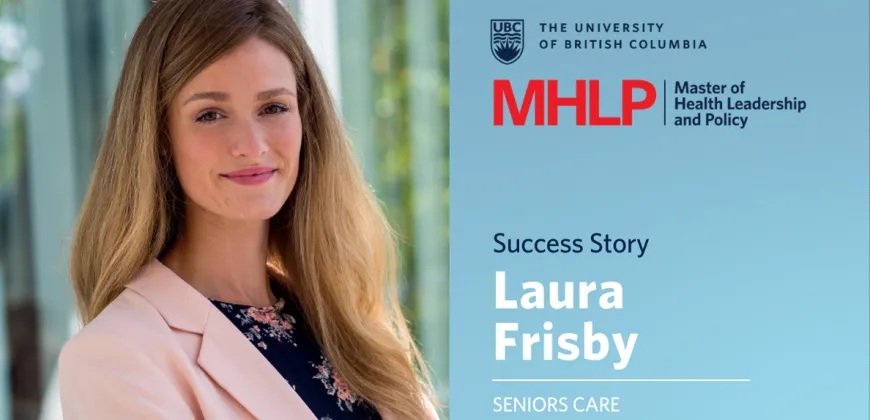Success Story: Laura Frisby
The MHLP in Seniors Care's unique interdisciplinary education made the program very appealing to Laura Frisby, who graduated in 2018 and is currently the acting regional palliative lead at Vancouver Coastal Health.

It’s an ongoing challenge for managers across health care to find individuals who have both clinical experience and the project management, communication and leadership skills to guide teams and oversee initiatives to deliver patient-centred care.
The UBC Master of Health Leadership and Policy (MHLP) in Seniors Care was designed to address this need by combining graduate courses in health care taught by leading researchers and practitioners from the UBC Faculty of Applied Science with courses on business and leadership through UBC Sauder’s Robert H. Lee Graduate School.
“It’s a given that we need more beds and more support for essential programs,” says Alison Phinney, an MHLP instructor and the director of graduate programs at the UBC School of Nursing.
“But we also need to rethink the system as a whole to ensure our models of care are effective, integrated and co-ordinated. Achieving this latter goal will require professionals grounded in clinical practice who also have the business knowledge and leadership skills to think critically about the current challenges and envision new possibilities.”
This unique interdisciplinary education made the program very appealing to Laura Frisby, who graduated in 2018 and is currently the acting regional palliative lead at Vancouver Coastal Health.
It’s a position that sees her rolling out initiatives with teams across the health authority, including those in long-term care, hospitals, home and community care, and hospices.
Laura entered the program with a bachelor of science in dietetics and several years of experience working in long-term care facilities as a registered dietitian. She was seeking a position with more responsibility and believed that the MHLP in Seniors Care could get her there.
“A clinically focused master’s degree would not have helped me grow my leadership and project management skills to the same degree,” she says. “This program allowed me to develop a specialization in seniors care while also building skills in other areas that are enabling me to have a more far-reaching impact.”
A grounding in clinical practice
The challenges within our health-care system are complex, requiring people with wide-ranging knowledge and an array of interdisciplinary skills.
Students in the program deepen their understanding of the care environment through courses on healthy policy, social epidemiology, philosophies of care, organizational considerations for delivering health care, research and evidence based practices, and social and environmental planning.
It’s a broad focus that enables students to enhance their knowledge of environmental gerontology, analyze and use data for decision-making, and better understand the non-technical issues that affect service delivery across a range of settings.
Laura says her courses gave her a more integrated understanding of the factors that influence care. “Part of my role is connecting with other health authorities and provinces to explore alignment with our practices,” she says.
“The policy course has provided an overlap with some of this work, helping me appreciate what goes into policy development. Similarly, our discussions of the impact of an organization’s visions and values on its culture was also extremely relevant.”
Strong leadership and project management skills
Leading complex projects and managing interdisciplinary teams requires skills in project management, communication, change management and leadership.
Students in the MHLP in Seniors Care learn these skills through business and leadership courses taught through UBC Sauder’s Robert H. Lee Graduate School, with classes on organizational leadership, project management, and leadership and sustainability.
An intense four-week business boot camp introduces students to six core business competencies, from accounting and operations management to business case development, and students can also take an additional business course of their choosing.
Laura credits the business courses with helping her make the successful transition to her current leadership role overseeing initiatives to improve palliative care.
“I use the knowledge I gained in the organizational behaviour class to determine how to appeal to and communicate with stakeholders across our organization on the priorities and initiatives we are trying to achieve,” she says.
“The tools I learned in the project management class have also helped me move projects forward. And the business bootcamp – which followed the Harvard Business School case method review process – developed my confidence in summarizing concepts and presenting them to a group even when I had very little time to prepare.”
Laura also says that the tools and strategies she learned in a class on operations are helping her identify bottlenecks in organizational structures and processes.
A bridge between teams to deliver high-impact results
Through case studies, class discussions and group projects, the MHLP in Seniors Care gives health-care professionals the communication, collaboration and leadership skills to become the connecting link between stakeholders.
“Working in groups with people from such a variety of professional backgrounds exposed me to the different ways people think and their differing priorities and concerns,” says Laura.
“I’ve adapted this in my work – making certain, for example, that when I’m speaking with leaders from different disciplines that I present them with the information that’s most relevant to them. Being exposed to financial analysis within the program has also been a real benefit.”
Above all, she says the program encouraged her to shift her mindset from clinician to leader. “The program taught us to look beyond best practices to challenge the status quo, and to think first and foremost about impact and outcomes.”